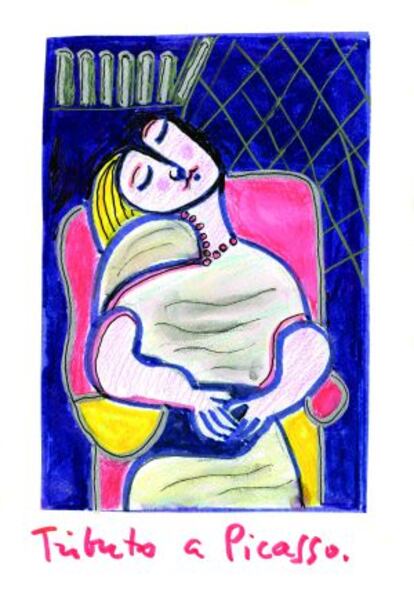“To be honest, it’s been months since I played a record”
At 64, celebrated singer-songwriter Joaquín Sabina shows signs of winding down


In 1969 Phil Ochs released an LP entitled Rehearsals for retirement. The singer-songwriter from Texas said he was bowing out because of the horrifying political situation in his country, then under the Nixon administration.
In a way, the Spanish singer-songwriter Joaquín Sabina also appears to portray a lack of interest - one might even call it a tremendous weariness - on the subject of music.
Sabina has a new album in the pipeline, although he gets all muddled up when he tries to explain one of its songs: "You'll like it; it's dedicated to the deceased Tom Waits... Wait, what am I saying? Sorry, I'm talking about the guy who died this summer. That's right, J. J. Cale. The song title is even Cuerpo de jota jota [Body of JJ]!"
Do not be alarmed. The confusion is the result of this lack of passion.
"To be honest, it's been months since I played a record. I am buying the Beatles collection sold by EL PAÍS, but I don't actually listen to them. The first Sunday, I was about to play Sgt. Pepper, but in the end I didn't feel up to it. I'm just not feeling very psychedelic."

But Joaquín, how can this be? No music at all? "Oh all right, sometimes I find a concert on some weird TV channel and leave it on for a while. I watched a Springsteen concert. And some new bands that left no impression on me; I can't even remember their names."
The TV set is an important home appliance inside Sabina's den, located in Tirso de Molina square, in downtown Madrid. "It's always on, with the sound off but with the remote control nearby in case I see something that grabs my attention."
One of the most successful performers in the Spanish-speaking world, with 19 albums to his name as well as extensive songwriting work for other artists, the 64-year-old Sabina says that he, like the deceased poet Rafael Alberti, always has a suitcase ready for emergencies.
"I share that fear of a coup or a revolution, and not necessarily from the left," he says. "With everything that's happening, anything is possible. I don't know how much longer Spaniards will be willing to put up with it. We are resigned folk, but hell, they're pissing in our soup again and again."
Where would he go into exile if it came down to it? "In Latin America. I like the way they speak Spanish, but also their dances, the women's hips, the alcohol, the feelings that are expressed emphatically, everything."
But let's not get carried away by all the dramatic speculation. This is still the same old Sabina, talkative and witty, all dressed up though perhaps skinnier than before. All around him, a female garde du corps sees to his every need.
"I let myself be pushed around by them: I don't drive and I don't have a cellphone. I don't use the internet, either. What for? The main things filter into the print media, and the rest I'm just not interested in. Not even pornography, even though I have always defended dirty movies. I hate today's porn, with those waxed bodies. Give me a curly pubis and undies with garter belts any day," he laughs.
Sabina seems to have the King Midas touch, turning everything to gold. Besides his albums, some of which have gone platinum, his books have always sold well too, including several biographies and sonnet collections (he is also a published poet). Everything suggests that his latest release, a compilation of drawings and notes called Muy personal (Very personal) will sell just as well. "Yes, it's conceived as a Christmas present for the hardcore Sabina fans," he admits.
Ángeles Aguilera, a publisher at Planeta, took away some of his notebooks with "annotations and doodles, with a lot of color in it." The selection was made by the publishers, he warns. "With so many tits and asses, people are going to think I'm horny. Actually, there's also a lot of roosters in there, so probably someone will make a Freudian interpretation of that. Oh well, as long as they admit that I'm a better graphic artist than Dylan..." he says, laughing heartily.
The edition is not exemplary. For one thing, it lacks transcriptions of his texts, which are sometimes quite illegible. "That's just you and your obsessions, you always want to find out about everything [more laughs]. Leaving it that way provides more ambiguity. For instance, I jotted down a phrase I saw at [contemporary art fair] Arco: 'Enough, sons of bitches.' Maybe there was a political meaning behind it, but I would rather view it as a cry of protest against the art world, against the Damien Hirsts, the installations, the performances, all that. When I run into that collection of hicks and swindlers, I get all riled up."
Going back to his new album, "in general the new songs talk about deterioration, both social and personal. They may be the perfect excuse for a farewell tour. A real farewell, even if I do the odd performance later, like Miguelito [he means Miguel Ríos]. The truth is, I could be perfectly happy without stepping on a stage again. That should be left to the youngsters."
Tu suscripción se está usando en otro dispositivo
¿Quieres añadir otro usuario a tu suscripción?
Si continúas leyendo en este dispositivo, no se podrá leer en el otro.
FlechaTu suscripción se está usando en otro dispositivo y solo puedes acceder a EL PAÍS desde un dispositivo a la vez.
Si quieres compartir tu cuenta, cambia tu suscripción a la modalidad Premium, así podrás añadir otro usuario. Cada uno accederá con su propia cuenta de email, lo que os permitirá personalizar vuestra experiencia en EL PAÍS.
¿Tienes una suscripción de empresa? Accede aquí para contratar más cuentas.
En el caso de no saber quién está usando tu cuenta, te recomendamos cambiar tu contraseña aquí.
Si decides continuar compartiendo tu cuenta, este mensaje se mostrará en tu dispositivo y en el de la otra persona que está usando tu cuenta de forma indefinida, afectando a tu experiencia de lectura. Puedes consultar aquí los términos y condiciones de la suscripción digital.








































